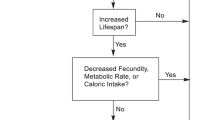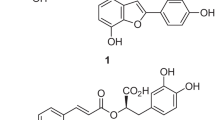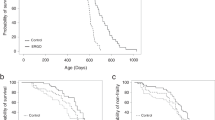Abstract
Rationale
Alcoholism and obesity impart a deleterious impact on human health and affects the quality of life. Chronic consumption of alcohol and western diet has been reported to cause memory deficits. 7,8-dihydroxyflavone (7,8-DHF), a TrkB agonist, comprises antioxidant and anti-inflammatory properties in treating various neurological disorders.
Objectives
The current study was aimed to determine the protective effect and molecular mechanism of 7,8-DHF against alcohol and high-fat diet (HFD)-induced memory deficits in rats.
Methods
The adult male Wistar rats were given alcohol (3–15%) and HFD ad libitum for 12 weeks in different experimental groups. 7,8-DHF (5 mg/kg) was intraperitoneally injected daily for the last 4 weeks (9th–12th week).
Results
The alcohol and HFD administration caused cognitive impairment as evaluated through the Morris water maze (MWM) test in alcohol, HFD, and alcohol + HFD-fed animals. The last 4-week treatment of 7,8-DHF (5 mg/kg; i.p.) attenuated alcohol and HFD-induced memory loss. 7,8-DHF treatment also restored the glutathione (GSH) level along with attenuation of nitrite, malondialdehyde content (markers of oxidative and nitrosative stress), and reduction of the acetylcholinesterase activity in the hippocampus of alcohol and HFD-fed animals. Furthermore, the administration of 7,8-DHF caused downregulation of NF-κB, iNOS, and caspase-3 and upregulation of Nrf2, HO-1, and BDNF mRNA level in rat hippocampus.
Conclusion
7,8-DHF administration conferred beneficial effects against alcohol and HFD-induced memory deficit via its unique antioxidant, anti-inflammatory, anti-apoptotic potential, along with the activation of TrkB/BDNF signaling pathway in the hippocampus.










Similar content being viewed by others
References
Alarcon G, Roco J, Medina M et al (2018) High fat diet-induced metabolically obese and normal weight rabbit model shows early vascular dysfunction: mechanisms involved. Int J Obes
Alonso M, Vianna MRM, Depino AM et al (2002) BDNF-triggered events in the rat hippocampus are required for both short- and long-term memory formation. Hippocampus. https://doi.org/10.1002/hipo.10035
Alzoubi KH, Mayyas FA, Mahafzah R, Khabour OF (2018) Melatonin prevents memory impairment induced by high-fat diet: role of oxidative stress. Behav Brain Res 336:93–98. https://doi.org/10.1016/j.bbr.2017.08.047
Bajaj JS (2019) Alcohol, liver disease and the gut microbiota. Nat Rev Gastroenterol Hepatol
Barson JR, Karatayev O, Chang G-Q, Johnson DF, Bocarsly ME, Hoebel BG, Leibowitz SF (2009) Positive relationship between dietary fat, ethanol intake, triglycerides and hypothalamic peptides: counteraction by lipid-lowering drugs. Alcohol 43:433–441
Borovikova LV, Ivanova S, Zhang M et al (2000) Vagus nerve stimulation attenuates the systemic inflammatory response to endotoxin. Nature. https://doi.org/10.1038/35013070
Bouvier E, Brouillard F, Molet J, Claverie D, Cabungcal JH, Cresto N, Doligez N, Rivat C, Do KQ, Bernard C, Benoliel JJ, Becker C (2017) Nrf2-dependent persistent oxidative stress results in stress-induced vulnerability to depression. Mol Psychiatry 22:1701–1713. https://doi.org/10.1038/mp.2016.144
Buettner R, Parhofer KG, Woenckhaus M, Wrede CE, Kunz-Schughart LA, Schölmerich J, Bollheimer LC (2006) Defining high-fat-diet rat models: metabolic and molecular effects of different fat types. J Mol Endocrinol 36:485–501
Castello NA, Nguyen MH, Tran JD et al (2014) 7,8-dihydroxyflavone, a small molecule TrkB agonist, improves spatial memory and increases thin spine density in a mouse model of alzheimer disease-like neuronal loss. PLoS One. https://doi.org/10.1371/journal.pone.0091453
Chan CB, Tse MCL, Liu X, Zhang S, Schmidt R, Otten R, Liu L, Ye K (2015) Activation of muscular TrkB by its small molecular agonist 7,8-dihydroxyflavone sex-dependently regulates energy metabolism in diet-induced obese mice. Chem Biol 22:355–368
Chang HA, Wang YH, Tung CS et al (2016) 7, 8-dihydroxyflavone, a tropomyosin-kinase related receptor b agonist, produces fast-onset antidepressant-like effects in rats exposed to chronic mild stress. Psychiatry Investig. https://doi.org/10.4306/pi.2016.13.5.531
Chang HC, Tai YT, Cherng YG et al (2014) Resveratrol attenuates high-fat diet-induced disruption of the blood-brain barrier and protects brain neurons from apoptotic insults. J Agric Food Chem. https://doi.org/10.1021/jf403286w
Chen J, Chua K-W, Chua CC, Yu H, Pei A, Chua BH, Hamdy RC, Xu X, Liu CF (2011) Antioxidant activity of 7,8-dihydroxyflavone provides neuroprotection against glutamate-induced toxicity. Neurosci Lett 499:181–185. https://doi.org/10.1016/j.neulet.2011.05.054
Cho SJ, Kang KA, Piao MJ et al (2019) 7,8-dihydroxyflavone protects high glucose-damaged neuronal cells against oxidative stress. Biomol Ther. https://doi.org/10.4062/biomolther.2018.202
Choi JW, Lee CW, Lee J, Choi DJ, Sohng JK, Park YI (2016) 7, 8-dihydroxyflavone inhibits adipocyte differentiation via antioxidant activity and induces apoptosis in 3T3-L1 preadipocyte cells. Life Sci 144:103–112
Choubey P, Kwatra M, Pandey SN, Kumar D, Dwivedi DK, Rajput P, Mishra A, Lahkar M, Jangra A (2018) Ameliorative effect of fisetin against lipopolysaccharide and restraint stress-induced behavioral deficits via modulation of NF-kappaB and IDO-1. Psychopharmacology 236:741–752. https://doi.org/10.1007/s00213-018-5105-3
de la Monte S, Derdak Z, Wands JR (2012) Alcohol, insulin resistance and the liver-brain axis. J Gastroenterol Hepatol. https://doi.org/10.1111/j.1440-1746.2011.07023.x
De La Monte SM, Longato L, Tong M et al (2009) The liver-brain axis of alcohol-mediated neurodegeneration: role of toxic lipids. Public Health, Int. J. Environ. Res
de la Monte SM, Longato L, Tong M, Wands JR (2009) Insulin resistance and neurodegeneration: roles of obesity, type 2 diabetes mellitus and non-alcoholic steatohepatitis. Curr Opin Investig Drugs. https://doi.org/10.1016/j.ygyno.2014.12.035.Pharmacologic
Du A, Xie J, Guo K et al (2015) A novel role for synaptic acetylcholinesterase as an apoptotic deoxyribonuclease. Cell Discov 1:1–17. https://doi.org/10.1038/celldisc.2015.2
Duly AMP, Alani B, Huang EY-W et al (2015) Effect of multiple binge alcohol on diet-induced liver injury in a mouse model of obesity. Nutr Diabetes 5:e154. https://doi.org/10.1038/nutd.2015.4
Duron B, BM K (1963) Improved method for the determination of blood glutathione. J Lab Clin Med. https://doi.org/10.1021/acs.biomac.6b00278
Dwivedi DK, Jena GB (2019a) NLRP3 inhibitor glibenclamide attenuates high-fat diet and streptozotocin-induced non-alcoholic fatty liver disease in rat: studies on oxidative stress, inflammation, DNA damage and insulin signalling pathway. Naunyn Schmiedeberg's Arch Pharmacol:1–12. https://doi.org/10.1007/s00210-019-01773-5
Dwivedi DK, Jena GB (2019b) Diethylnitrosamine and thioacetamide-induced hepatic damage and early carcinogenesis in rats: role of Nrf2 activator dimethyl fumarate and NLRP3 inhibitor glibenclamide. Biochem Biophys Res Commun. https://doi.org/10.1016/j.bbrc.2019.11.100
Dwivedi DK, Jena GB (2018) Glibenclamide protects against thioacetamide-induced hepatic damage in Wistar rat: investigation on NLRP3, MMP-2, and stellate cell activation Naunyn Schmiedeberg's Arch Pharmacol 1–18. https://doi.org/10.1007/s00210-018-1540-2
Dwivedi DK, Kumar D, Kwatra M, Pandey SN, Choubey P, Lahkar M, Jangra A (2018) Voluntary alcohol consumption exacerbated high fat diet-induced cognitive deficits by NF-κB-calpain dependent apoptotic cell death in rat hippocampus: ameliorative effect of melatonin. Biomed Pharmacother 108:1393–1403. https://doi.org/10.1016/j.biopha.2018.09.173
Ellman GL, Courtney KD, Andres V, Featherstone RM (1961) A new and rapid colorimetric determination of acetylcholinesterase activity. Biochem Pharmacol. https://doi.org/10.1016/0006-2952(61)90145-9
Francis H, Stevenson R (2013) The longer-term impacts of Western diet on human cognition and the brain. Appetite
Gelineau RR, Arruda NL, Hicks JA et al (2017) The behavioral and physiological effects of high-fat diet and alcohol consumption: sex differences in C57BL6/J mice. Brain Behav. https://doi.org/10.1002/brb3.708
Gray JD, Rubin TG, Hunter RG, McEwen BS (2014) Hippocampal gene expression changes underlying stress sensitization and recovery. Mol Psychiatry. https://doi.org/10.1038/mp.2013.175
Green LC, Wagner DA, Glogowski J et al (1982) Analysis of nitrate, nitrite, and [15N]nitrate in biological fluids. Anal Biochem. https://doi.org/10.1016/0003-2697(82)90118-X
He J, Xiang Z, Zhu X et al (2016) Neuroprotective effects of 7, 8-dihydroxyflavone on midbrain dopaminergic neurons in MPP+-treated monkeys. Sci Rep. https://doi.org/10.1038/srep34339
Heldt SA, Stanek L, Chhatwal JP, Ressler KJ (2007) Hippocampus-specific deletion of BDNF in adult mice impairs spatial memory and extinction of aversive memories. Mol Psychiatry. https://doi.org/10.1038/sj.mp.4001957
Hu T, Fu Q, Liu X et al (2009) Increased acetylcholinesterase and capase-3 expression in the brain and peripheral immune system of focal cerebral ischemic rats. J Neuroimmunol. https://doi.org/10.1016/j.jneuroim.2009.04.002
Jang S-W, Liu X, Yepes M et al (2010) A selective TrkB agonist with potent neurotrophic activities by 7,8-dihydroxyflavone. Proc Natl Acad Sci. https://doi.org/10.1073/pnas.0913572107
Jangra A, Kasbe P, Pandey SN, Dwivedi S, Gurjar SS, Kwatra M, Mishra M, Venu AK, Sulakhiya K, Gogoi R, Sarma N, Bezbaruah BK, Lahkar M (2015) Hesperidin and silibinin ameliorate aluminum-induced neurotoxicity: modulation of antioxidants and inflammatory cytokines level in mice hippocampus. Biol Trace Elem Res 168:168–471. https://doi.org/10.1007/s12011-015-0375-7
Jangra A, Rajput P, Dwivedi DK, Lahkar M (2020) Amelioration of repeated restraint stress-induced behavioral deficits and hippocampal anomalies with taurine treatment in mice. Neurochem Res:1–10. https://doi.org/10.1007/s11064-019-02945-8
Kalb A, von Haefen C, Sifringer M et al (2013) Acetylcholinesterase inhibitors reduce neuroinflammation and -degeneration in the cortex and Hippocampus of a surgery stress rat model. PLoS One. https://doi.org/10.1371/journal.pone.0062679
Kasbe P, Jangra A, Lahkar M (2015) Mangiferin ameliorates aluminium chloride-induced cognitive dysfunction via alleviation of hippocampal oxido-nitrosative stress, proinflammatory cytokines and acetylcholinesterase level. J Trace Elem Med Biol 31:107–112
Khoursheed M, Miles PDG, Gao KM et al (1995) Metabolic effects of troglitazone on fat-induced insulin resistance in the rat. Metabolism. https://doi.org/10.1016/0026-0495(95)90151-5
Klok MD, Jakobsdottir S, Drent ML (2007) The role of leptin and ghrelin in the regulation of food intake and body weight in humans: a review. Obes Rev 8:21–34
Kothari V, Luo Y, Tornabene T et al (2017) High fat diet induces brain insulin resistance and cognitive impairment in mice. Biochim Biophys Acta Mol basis Dis. https://doi.org/10.1016/j.bbadis.2016.10.006
Kumar D, Kumar Dwivedi D, Lahkar M, Jangra A (2019) Hepatoprotective potential of 7,8-dihydroxyflavone against alcohol and high-fat diet induced liver toxicity via attenuation of oxido-nitrosative stress and NF-ҡB activation. Pharmacol Rep. https://doi.org/10.1016/j.pharep.2019.07.002
Li XH, Dai CF, Chen L et al (2016) 7,8-dihydroxyflavone ameliorates motor deficits via suppressing α-synuclein expression and oxidative stress in the MPTP-induced mouse model of Parkinson’s disease. CNS Neurosci Ther. https://doi.org/10.1111/cns.12555
Li Y, Liu L, Kang J et al (2000) Neuronal-glial interactions mediated by interleukin-1 neuronal acetylcholinesterase activity and mRNA expression. J Neurosci. https://doi.org/10.1523/jneurosci.20-01-00149.2000
Liu C, Chan CB, Ye K (2016) 7,8-dihydroxyflavone, a small molecular TrkB agonist, is useful for treating various BDNF-implicated human disorders. Transl, Neurodegener
Lowry OH, Rosebrough NJ, Farr AL, Randall RJ (1951) Protein measurement with the Folin phenol reagent. J Biol Chem 193:265–275
Mar D, Krolow R, Lampert C et al (2016) Early life adversities or high fat diet intake reduce cognitive function and alter BDNF signaling in adult rats : interplay of these factors changes these effects. Int J Dev Neurosci. https://doi.org/10.1016/j.ijdevneu.2016.03.001
Martinowich K, Manji H, Lu B (2007) New insights into BDNF function in depression and anxiety. Nat Neurosci
Mohajeri MH, Brummer RJM, Rastall RA, Weersma RK, Harmsen HJM, Faas M, Eggersdorfer M (2018) The role of the microbiome for human health: from basic science to clinical applications. Eur J Nutr 57:1–14. https://doi.org/10.1007/s00394-018-1703-4
Molteni R, Barnard RJ, Ying Z et al (2002) A high-fat, refined sugar diet reduces hippocampal brain-derived neurotrophic factor, neuronal plasticity, and learning. Neuroscience. https://doi.org/10.1016/S0306-4522(02)00123-9
Mousum SA, Ahmed S, Gawali B, Kwatra M, Ahmed A, Lahkar M (2018) Nyctanthes arbor-tristis leaf extract ameliorates hyperlipidemia- and hyperglycemia-associated nephrotoxicity by improving anti-oxidant and anti-inflammatory status in high-fat diet–streptozotocin-induced diabetic rats. Inflammopharmacology. 26:1415–1428. https://doi.org/10.1007/s10787-018-0497-6
Neha KA, Jaggi AS et al (2014) Silymarin ameliorates memory deficits and neuropathological changes in mouse model of high-fat-diet-induced experimental dementia. Naunyn Schmiedeberg's Arch Pharmacol 387:777–787. https://doi.org/10.1007/s00210-014-0990-4
Niccolai E, Boem F, Russo E, Amedei A (2019) The gut–brain axis in the neuropsychological disease model of obesity: a classical movie revised by the emerging director “microbiome.” Nutrients
Ohkawa H, Ohishi N, Yagi K (1979) Assay for lipid peroxides in animal tissues by thiobarbituric acid reaction. Anal Biochem 95:351–358. https://doi.org/10.1016/0003-2697(79)90738-3
Pant R, Jangra A, Kwatra M et al (2017) Cognitive deficits induced by combined exposure of stress and alcohol mediated through oxidative stress-PARP pathway in the hippocampus. Neurosci Lett:653. https://doi.org/10.1016/j.neulet.2017.05.058
Park HY, Park C, Hwang HJ, Kim BW, Kim GY, Kim CM, Kim ND, Choi YH (2014) 7,8-dihydroxyflavone attenuates the release of pro-inflammatory mediators and cytokines in lipopolysaccharide-stimulated BV2 microglial cells through the suppression of the NF-kappaB and MAPK signaling pathways. Int J Mol Med 33:1027–1034. https://doi.org/10.3892/ijmm.2014.1652
Park SE, Kim ND, Yoo YH (2004) Acetylcholinesterase plays a pivotal role in apoptosome formation. Cancer Res. https://doi.org/10.1158/0008-5472.CAN-04-0649
Paul R, Borah A (2017) Global loss of acetylcholinesterase activity with mitochondrial complexes inhibition and inflammation in brain of hypercholesterolemic mice. Sci Rep 7:1–13. https://doi.org/10.1038/s41598-017-17911-z
Rahman Z, Dwivedi DK, Jena GB (2019) Ethanol-induced gastric ulcer in rats and intervention of tert-butylhydroquinone: involvement of Nrf2/HO-1 signalling pathway. Hum Exp Toxicol 0960327119895559. doi: https://doi.org/10.1177/0960327119895559
Rajput P, Jangra A, Kwatra M et al (2017) Alcohol aggravates stress-induced cognitive deficits and hippocampal neurotoxicity: protective effect of melatonin. Biomed Pharmacother:91. https://doi.org/10.1016/j.biopha.2017.04.077
Rathnasamy G, Sivakumar V, Rangarajan P et al (2014) NF-κB–mediated nitric oxide production and activation of caspase-3 cause retinal ganglion cell death in the hypoxic neonatal retina. Investig Ophthalmol Vis Sci. https://doi.org/10.1167/iovs.13-13718
Reichardt LF (2006) Neurotrophin-regulated signalling pathways. Philos Trans R Soc B Biol Sci
Ren Q, Zhang JC, Ma M, Fujita Y, Wu J, Hashimoto K (2014) 7,8-Dihydroxyflavone, a TrkB agonist, attenuates behavioral abnormalities and neurotoxicity in mice after administration of methamphetamine. Psychopharmacology 231:159–166. https://doi.org/10.1007/s00213-013-3221-7
Salas IH, Weerasekera A, Ahmed T et al (2018) High fat diet treatment impairs hippocampal long-term potentiation without alterations of the core neuropathological features of Alzheimer disease. Neurobiol Dis. https://doi.org/10.1016/j.nbd.2018.02.001
Singh AK, Jiang Y, Gupta S, Benlhabib E (2007) Effects of chronic ethanol drinking on the blood-brain barrier and ensuing neuronal toxicity in alcohol-preferring rats subjected to intraperitoneal LPS injection. Alcohol Alcohol. https://doi.org/10.1093/alcalc/agl120
Sobesky JL, Barrientos RM, De May HS et al (2014) High-fat diet consumption disrupts memory and primes elevations in hippocampal IL-1β, an effect that can be prevented with dietary reversal or IL-1 receptor antagonism. Brain Behav Immun 42:22–32
Spencer SJ, D’Angelo H, Soch A et al (2017) High-fat diet and aging interact to produce neuroinflammation and impair hippocampal- and amygdalar-dependent memory. Neurobiol Aging. https://doi.org/10.1016/j.neurobiolaging.2017.06.014
Srinivasan K, Patole PS, Kaul CL, Ramarao P (2004) Reversal of glucose intolerance by pioglitazone in high fat diet-fed rats. Methods Find Exp Clin Pharmacol 26:327–333
Toiber D, Berson A, Greenberg D et al (2008) N-acetylcholinesterase-induced apoptosis in alzheimer’s disease. PLoS One. https://doi.org/10.1371/journal.pone.0003108
Tyagi E, Agrawal R, Nath C, Shukla R (2008) Influence of LPS-induced neuroinflammation on acetylcholinesterase activity in rat brain. J Neuroimmunol. https://doi.org/10.1016/j.jneuroim.2008.08.015
Vorhees CV, Williams MT (2006) Morris water maze: procedures for assessing spatial and related forms of learning and memory. Nat Protoc 1:848–858
Wu A, Ying Z, Gomez-Pinilla F (2004) The interplay between oxidative stress and brain-derived neurotrophic factor modulates the outcome of a saturated fat diet on synaptic plasticity and cognition. Eur J Neurosci. https://doi.org/10.1111/j.1460-9568.2004.03246.x
Wu CH, Hung TH, Chen CC et al (2014) Post-injury treatment with 7,8-dihydroxyflavone, a TrkB receptor agonist, protects against experimental traumatic brain injury via PI3K/Akt signaling. PLoS One. https://doi.org/10.1371/journal.pone.0113397
Wu YT, Beiser AS, Breteler MMB et al (2017) The changing prevalence and incidence of dementia over time-current evidence. Nat. Rev, Neurol
Ye W, Gong X, Xie J, Wu J, Zhang X, Ouyang Q, Zhao X, Shi Y, Zhang X (2010) AChE deficiency or inhibition decreases apoptosis and p53 expression and protects renal function after ischemia/reperfusion. Apoptosis. 15:474–487. https://doi.org/10.1007/s10495-009-0438-3
Yoshii A, Constantine-Paton M (2010) Postsynaptic BDNF-TrkB signaling in synapse maturation, plasticity, and disease. Dev Neurobiol
You M, Fischer M, Deeg MA, Crabb DW (2002) Ethanol induces fatty acid synthesis pathways by activation of sterol regulatory element-binding protein (SREBP). J Biol Chem. https://doi.org/10.1074/jbc.M202411200
Zeng Y, Lv F, Li L et al (2012) 7,8-dihydroxyflavone rescues spatial memory and synaptic plasticity in cognitively impaired aged rats. J Neurochem. https://doi.org/10.1111/j.1471-4159.2012.07830.x
Zhang XJ, Yang L, Zhao Q et al (2002) Induction of acetylcholinesterase expression during apoptosis in various cell types. Cell Death Differ. https://doi.org/10.1038/sj.cdd.4401034
Zhang Z, Liu X, Schroeder JP et al (2014) 7,8-dihydroxyflavone prevents synaptic loss and memory deficits in a mouse model of Alzheimer’s disease. Neuropsychopharmacology. https://doi.org/10.1038/npp.2013.243
Zou J, Crews FT (2012) Inflammasome-IL-1β signaling mediates ethanol inhibition of hippocampal neurogenesis. Front Neurosci. https://doi.org/10.3389/fnins.2012.00077
Acknowledgments
The authors are immensely thankful to Gauhati Medical College and Hospital, Guwahati, Institutional Level Biotech hub and State Biotech Hub, College of Veterinary Sciences, Guwahati for providing technical support.
Funding
The National Institute of Pharmaceutical Education and Research (NIPER) Guwahati provided financial support.
Author information
Authors and Affiliations
Corresponding author
Ethics declarations
The present study was carried out in accordance with the guidelines of the Committee for the Purpose of Control and Supervision of Experimentation on Animals (CPCSEA), New Delhi, India. The study protocol was approved by the Institutional Animals Ethics Committee at Gauhati Medical College and Hospital, Guwahati, India.
Conflict of interest
The authors declare that they have no conflict of interest.
Additional information
Publisher’s note
Springer Nature remains neutral with regard to jurisdictional claims in published maps and institutional affiliations.
Rights and permissions
About this article
Cite this article
Pandey, S.N., Kwatra, M., Dwivedi, D.K. et al. 7,8-Dihydroxyflavone alleviated the high-fat diet and alcohol-induced memory impairment: behavioral, biochemical and molecular evidence. Psychopharmacology 237, 1827–1840 (2020). https://doi.org/10.1007/s00213-020-05502-2
Received:
Accepted:
Published:
Issue Date:
DOI: https://doi.org/10.1007/s00213-020-05502-2




